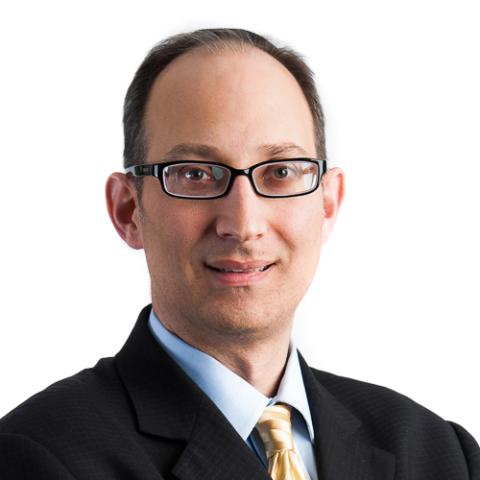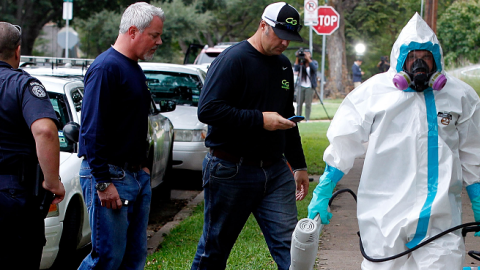Until recently, the bulk of the Obama administration’s efforts in the fight against Ebola have been on the international front. The emergence of a second Ebola case in Dallas — a nurse caring for the first patient — raises important questions of how to prevent a domestic outbreak from turning into an epidemic.
Given the pace of spread in West Africa, a broader U.S. outbreak is almost inevitable. We will see clusters of infection in major Western cities, including the U.S. Our aim must be to keep these clusters small, and to limit secondary spread.
Ebola is controllable in the U.S., but only if political officials and our public health professionals do the right things. Unfortunately, it’s clear that both local and federal officials fell short in Dallas.
Immigration officials failed to detect the risk this person posed as he arrived. The hospital didn’t take proper care when he first presented to doctors.
Once he fell ill, it took an emergency, federal “waiver” to give local officials the permission to clean his contaminated, infectious waste. When the decision was made to quarantine his exposed family members, there was no place for federal officials to house them, and no clear rules for how they would be held.
Finally, even though the hospital followed Centers for Disease Control protocols, a nurse still contracted the disease, calling into question the hospital’s training procedures and other steps taken to protect workers.
Health care professionals at all levels are of course not perfect and will make mistakes. Hospital protocols and public health preparedness plans must leave room for human error — especially when it comes to very hot pathogens like Ebola. But the CDC must do a better job of establishing clear and accurate procedures, take appropriate measures to reduce risk, and properly calibrate its public statements, if we’re going to inspire the public confidence that will be needed to prevent disruptions in the likely event of a wider, future outbreak.
First, on flights coming in from West Africa – public health officials have noted that shutting down the air routes to the U.S. can make a bad situation worse. Mostly this issue pertains to the cargo traffic that would be cut off, leaving these nations isolated at a time that their economies are already reeling. As for the passenger traffic, there are two airlines (Royal Air Morocco and Brussels Airlines) that collectively run a total of five connecting flights a week out of Liberia and to the U.S.
President Obama, under political pressure, may soon decide to stop air travel from West Africa to the U.S. In the meantime, even though the U.S. is now belatedly announcing that it will start closer screening of air passengers originating from Ebola affected countries (including routine checks for fevers) there’s more that the U.S. can do, short of outright travel bans, to reduce the odds of direct spread from air travelers.
One option is to place U.S. personnel in West African airports, rather than relying on local officials to conduct the front-end exit screening. Only about 150 people a day arrive from West Africa aboard these flights. It’s a small enough number to subject all of the travelers to more vigorous outbound scrutiny.
People traveling through the West African airports report that the current exit screening are not consistently — or rigorously — applied. On the margins, more vigilant checks under the supervision of U.S. personnel might discourage exposed or sick people from trying to board planes at the outset. It would also give public health workers more information on the U.S. side of those flights to better target screening efforts. U.S. officials could then follow up recent arrivals in the U.S. with phone calls to check on their health.
Second, on the snafus that plagued the case in Dallas. Hospitals must adopt procedures for flagging patients who meet criteria that put them at risk for having Ebola. That starts with establishing patient travel history. In addition, all hospitals should implement practices like those in place at institutions such as Elmhurst Hospital in Queens or Brigham and Women’s in Boston which have set up special units in Emergency Rooms to handle suspected cases. Furthermore, hospitals and clinics need to be on alert, and act accordingly. More senior medical personnel should evaluate anyone who meets certain criteria for risk of Ebola infection.
CDC might also consider establishing regional centers of excellence to handle the treatment of Ebola infected patients. This would make it easier to implement the kind of intense training and procedures needed to manage these difficult cases.
Third, on the proper handling of confirmed cases, updated quarantine regulations were first proposed in 2005 during the Bush Administration amid fears of pandemic flu. The regulations spelled out in detail how CDC would exercise its broad powers to involuntarily confine sick individuals and those believed to be exposed to certain deadly pathogens. The set of regulations also included a new and controversial “provisional quarantine” rule. It would have allowed CDC to detain suspected cases involuntarily for up to three days.
Yet in laying out these proposed quarantine procedures, the CDC rule proved controversial precisely because it exposed the agency’s sweeping powers. So President Obama withdrew the rule in 2010. CDC still retains such powers, only now there are no modern regulations to guide how they’d be implemented.
It’s too late to issue regulations for the current crisis. But CDC can and should promulgate guidance that would clarify key gaps, including those that emerged in Dallas (such as where to house quarantine subjects, how they would be held, and what criteria would be used to obligate a person to involuntary quarantine – or allow them to exit from the restrictions).
Finally, continued reassurances in the wake of what has happened in Texas risk making further government statements on the issue lose credibility. CDC must maintain its ability to communicate public health messages to the American people, and to be listened to as a voice of authority. CDC needs to make sure that bland reassurances will not be contradicted by fast-breaking events.
The most profound Ebola risk in the U.S. isn’t going to be from isolated cases. It will be a few months from now, if the epidemic continues to spread in West Africa, and larger clusters emerge in major U.S. cities. This could have disastrous effects, on both our health and our economic systems.
We can protect the U.S. from these disasters, but will need to see improved performances, at all levels of our public health system, in order to do so.




















